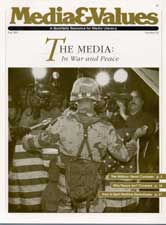Reporting Conventions Mask Sexual Politics
|
This article originally appeared in Issue# 56
|
The day after the war with Iraq began, I sat in front of my television and listened to a young white U.S. fighter pilot brag about his first bombing mission over Baghdad: "We scored a touchdown, and nobody was home!" I had been paying attention to the impact of the Gulf crisis on women for months, but this pilot's declaration of victory, made just 10 days before the Superbowl on January 27, raised new questions.
As the pilot's comment sank in, I wondered: Do these pilots really think that bombs are as harmless as footballs, that wars are like games, with scoreboards, time limits and cheering fans? Our familiarity with sexist metaphors means that we hear them, but miss the violence they contain. In the United States, we first saw signs of the sexual politics of the Gulf crisis in August, when images of US women soldiers, toting rifles and desert-camouflage backpacks in Saudi Arabia, were paraded on TV screens and in the papers. As polls began to reveal significant gaps between men's and women's willingness to go to war, the government and the media stepped up efforts to counter the gender gap. We were told that the presence of US women soldiers would have a liberating influence on Arab women, as if the latter were silent, apolitical, and completely controlled by their culture and religion.
Arab women, in fact, were at the forefront of protesting aggression in the Gulf. Kuwaiti women risked their lives protesting the Iraqi invasion--both Amnesty International and Middle East Watch reported nonviolent women's demonstrations in Kuwait as early as August 1990--demonstrations that the Iraqi military fired on.
As the image of the silenced, controlled Arab woman proves to be ever less accurate, so does the picture of the liberated female US soldier. Yet, for women, military service is not much different than domestic employment: 64 percent of the women in the US military have been sexually harassed on the job, according to a recent Department of Defense report. Shortly after troops were deployed to the Gulf, women soldiers became a standard human interest story.
Attempts to sanitize the Gulf War and make it more "spectator compatible" did not stop with comparisons to football. The New York Times' "War Notebook" in February 1991 included the term "Ninja woman." Used by troops to refer to Saudi women dressed and veiled in black, the connotation was that Saudi women are not real people with real lives, but rather something exotic and mysterious.
Nor did attempts to make war seem entertaining stop once US troops came home. At a celebration for returning soldiers, a young man proudly wore a T-shirt with the words "US World Tour." Below this was a list of "venues"--countries the United States has overpowered militarily in recent years. Is Iraq the most recent stop on the military world tour?
All these attempts to render war as "harmless" as hometown sports, action-packed movies and popular music tours separate soldiers as well as US civilians from war's brutality and ethical bankruptcy. For women, though, the analogies do something else that is especially frightening. Football is an aggressive sport played by males, for males, with women present, ideally, only to cheerlead. Martial arts movies have been condemned for their excessive violence, as well as for the racist messages they often convey about Asians and "the Orient." And women have criticized the images of sexual violence against women in heavy metal music, an industry dominated by white male performers.
The metaphors of explicit sexual violence are the most frightening of all. Listening to the US military talk about the conflict, I began to realize that the United States was being portrayed as the masculine conqueror and Iraq as the feminine victim. An Air Force pilot at the start of the war predicted "it will just be 'Slam, bam, thank you Saddam.'" As reported in Ms. (March/April 1991) when Hussein rallied his troops to fight "the mother of all battles," one Air Force officer responded with a challenge smacking of domestic violence: "Tell him Dad's coming to kick Mom's butt." Most chilling of all, the Washington Post reported in January that "fighter pilots aboard the U.S.S. John F. Kennedy watched porno movies before their bombing missions."
We are used to seeing women as victims of violence; so we don't keep track of the impact of the Gulf War on actual women--in particular the women of Iraq and Kuwait. No cheering fans support the women, particularly the refugee women, who bear the primary responsibility for rebuilding their families' lives and their communities.
Copyright 1991 by Christianity and Crisis, Inc. Reprinted with permission from the June 10, 1991 issue of Christianity and Crisis.



